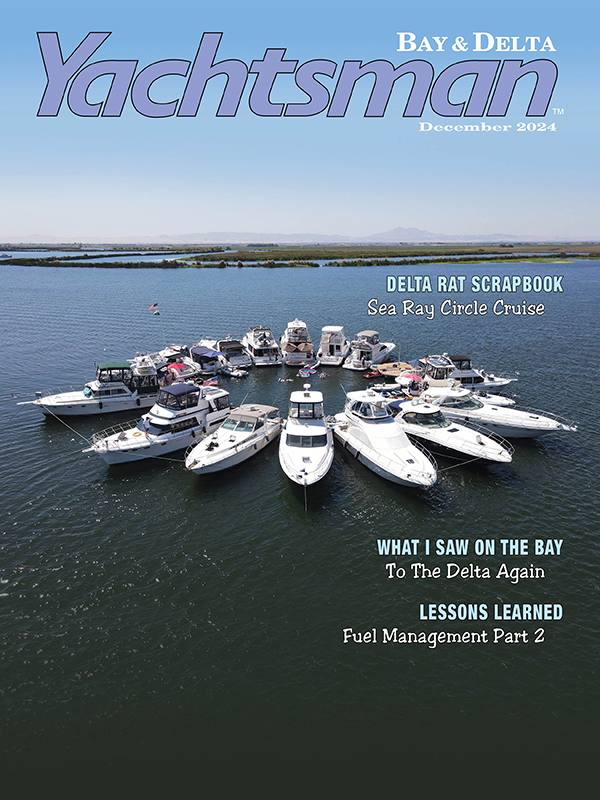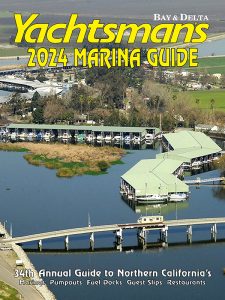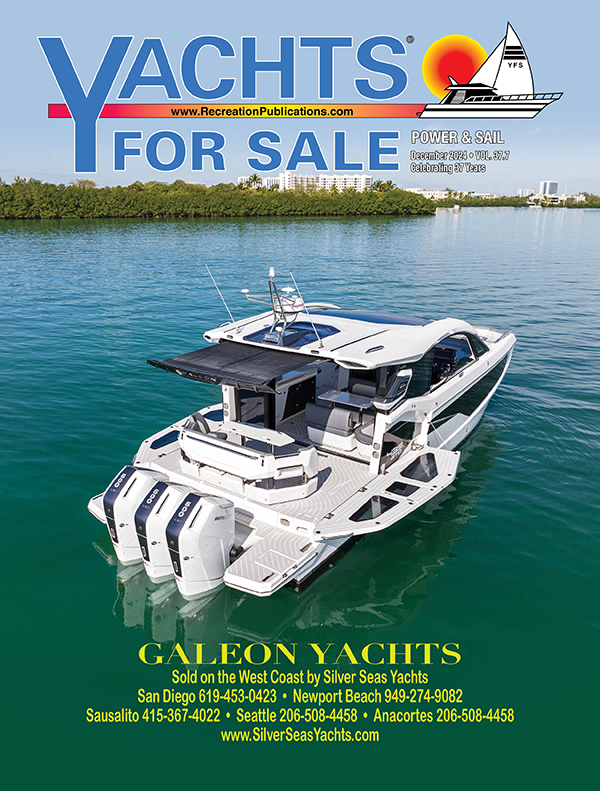Lessons Learned – by Pat Carson

A Legal Charter?
Remember the good old days back in 2019? New boat sales were hot with dealers having a hard time keeping boats in the 36- to 60-foot range in stock. Many of those new boat sales came with trade-ins or the owners listing them with one of the many brokers that market previously owned yachts. As we rolled into 2020, yacht sales for the first quarter were still brisk however there was concern that the virus was making its way around the world and no one knew for sure how it would impact boat sales. Many of us in the yacht business were preparing for the worst and started reducing staff, stopped or delayed any large purchases and waited to see how the market would shake out. To everyone’s surprise, the hot market got hotter and by the second quarter many of the boat manufactures that had previously cut back were now finding themselves with no inventory, shuttered manufacturing facilities and unable to fulfill demand. The resale market also exploded and soon that inventory also vanished, and prices skyrocketed.
With other forms of recreation severely limited by government control, recreational boating enjoyed a surge of first-time boat owners of both new and resale boats. My personal business greatly benefitted with the surge in local and offshore deliveries, and the need for instruction hit record demand. Among the many questions that I get, and one of the most common from new boat owners, is can I charter my boat out like I do with my vacation home? The answer is real clear, maybe.
An Illegal Charter?
An illegal charter is a pay for hire operation where boat owners or someone they hire takes passengers on the water without the proper credentials, and in some cases without proper safety gear or inspections. Perhaps one of your friends thought that it would be a great idea to host a group of friends aboard your boat for a party and offered to pay a few hundred dollars to cover the cost of the fuel. Or, perhaps a group of friends would like to go out on a fishing trip aboard your new sport fisher and offered to help with the costs by donating fuel and supplies. Either of these could get you in trouble with the federal law enforcement authorities as the owner, unless you are an authorized passenger for hire operation. Any vessel owner operating their boat as a “for hire service” but without the proper U.S. Coast Guard documentation is in violation of federal law. Captains are required to meet certain licensing requirements and the vessel must pass a safety inspection.

It is a fine line between legally operating as a recreational vessel and illegally operating as a passenger vessel, and the differences can be subtle. A passenger for hire is defined as a passenger for whom consideration is a mandatory condition of the voyage. Consideration is defined as any economic benefit and can be payment of money, donation of fuel, food or supplies. A guest may offer to share the costs, but if the contribution is a requirement then the vessel is operating as a passenger vessel and therefore requires a licensed captain. An easy test is if the voyage would not occur without some consideration from the passengers then you are considered a charter taking passengers for hire.
In Sept 2020, Coast Guard Sector San Francisco investigators conducted an operation with local law enforcement throughout the course of a week to terminate unlicensed and illegal charter boat operations in Lake Tahoe. More than 150 vessels were boarded. Six illegal charter boats were discovered, cited and terminated due to violations. On Sunday, Sept 7, the crew of a 29-foot response boat from the Coast Guard Station Lake Tahoe boarded the 48-foot pleasure craft, Cirque. On board were 19 passengers and the boat was found to be in violation under definition of a legal charter.

They discovered the following violations on the Cirque:
- Violation of 46 CFR 176.100 (a) for not having a valid Certificate of Inspection.
- A vessel to which this subchapter applies may not be operated without having on board a valid U.S. Coast Guard Certificate of Inspection. Each vessel inspected and certified under the provisions of this subchapter must, when any passengers are aboard during the tenure of the certificate, be in full compliance with the terms of the certificate.
- Violation of 46 CFR 15.401(a) for not having an individual with an appropriate license.
- A person may not employ or engage an individual, and an individual may not serve in a position in which an individual is required by law or regulation to hold a license, certificate of registry, Merchant Mariner’s Document (MMD), Transportation Worker Identification Credential (TWIC) and/or Merchant Mariner Credential (MMC), unless the individual holds all credentials required as appropriate, authorizing service in the capacity in which the individual is engaged or employed, and the individual serves within any restrictions placed on the credential. An individual holding an active license, certificate of registry, MMD, or MMC issued by the Coast Guard must also hold a valid TWIC issued by the Transportation Security Administration unless the individual is exempt.
- Violation of 46 CFR 16.201 for failure to have a drug and alcohol program.
- Chemical testing of personnel must be conducted as required by this subpart and in accordance with the procedures detailed in 49 CFR part 40.
- Violation of 46 CFR 170.120 for failure to have a valid stability letter.
- Each vessel must have a stability letter issued by the Coast Guard before the vessel is placed into service. This letter sets forth conditions of operation. A stability letter is not required if the information can be placed on the Certificate of Inspection or the Load Line Certificate.
“The Coast Guard will aggressively pursue any operator who is putting their customers at risk by operating outside these critical safety requirements,” said Lt. Andrew Cole, Coast Guard Sector San Francisco’s lead investigating officer.
Any boat carrying passengers for hire are required to have a captain that holds a Coast Guard license, and the vessel must meet minimum safety standards. Uninspected passenger vessels are only permitted to carry up to six passengers for hire under Coast Guard regulations. Owners and operators of illegal charter boats can face civil penalties for illegal passenger for hire operations.
Charter boats must be operated by someone who holds a valid Coast Guard issued Merchant Mariner’s license or credential, and the captain must have the license on board according to regulations. The entry level credential is an OUPV or Operator of Uninspected Passenger Vessel and that allows the mariner to take up to six passengers for hire. Any boat carrying more than six passengers for hire must be operated by a Captain with a Master’s license. A maximum of 12 passengers plus the charterer are allowed on the vessel, not including crew.
Boat Bed And Breakfast
Using a recreational vessel as a bed and breakfast in which the owner/operator/agent receives consideration for people to remain overnight on board the vessel is a commercial operation, and these vessels are subject to Coast Guard rules and regulations. To conduct a boat bed and breakfast operation in accordance with Federal statute, the owner/operator/agent can operate as a charter vessel with no crew provided, limited to 12 passengers and a written contract is required. Or operate as an uninspected passenger vessel less than 100 GRT and have up to six passengers and the vessel must be operated by a Master who holds an OUPV Merchant Mariner Credential. A Coast Guard safety inspection may be required.
Does Your Insurance Cover Chartering Your Vessel?
Again, a real clear maybe. In an effort to get a clearer picture, I contacted the area’s local insurance expert and friend, Gary Clausen, of Twin Rivers Marine Insurance Agency. Gary has spent a major portion of his life working in and around California boating. He has been in the marine business since 1972 and in the marine insurance business since 1989. Needless to say, Gary has seen it all and offered some perspective on the insurance requirements for commercial vessel operations.

“If a vessel owner wants to charter his private boat as a six-pack charter, there are many companies that will write this kind of policy as long as there is a licensed captain in control of the vessel, and he/she is protected by a Jones Act policy,” Clausen explained. “Many companies will allow a specific number of charters annually, until 30 or so, and then most underwriters will consider you a commercial operation and not a private recreational boat owner.”
If you intend to have more than six passengers for hire and less than 12, some insurance companies will allow this, however you must have a written charter agreement that has been approved by the underwriter,” Clausen offered. Many insurance underwriters will have per event fees in addition to the usual policy premiums. Again, check with your insurance company to make sure that you completely understand the costs. For more information about the Jones Act see my May 2019 article in the Bay & Delta Yachtsman magazine.
On the other hand, most insurance companies will not allow you to operate a bareboat charter with your private recreational policy. You will need to check the details of your policy, but do not be surprised if coverage is excluded.
Thinking of trying out being a yacht B&B operation? Some insurance underwriters have a specific B&B program. Most of the time you will be required to have a professional management company manage the operation and must include a manager that supervises a rental plan, personally reviews the startup and shutdown procedures of the vessel and ensures that the renter is familiar with all aspects of the vessel. When you see the premium and wonder why the costs are so high, consider the risks of having non boaters on a boat that do not understand the various systems on a vessel that differ from the typical land-based dwelling. Higher risk, higher cost.
Lessons Learned
A couple of bareboat charter common errors to be cognizant of. A chartered vessel may never carry more than 12 passengers for hire whether underway or moored. This includes a vessel being used as a bed and breakfast. Both United States and foreign-flagged vessels may be chartered, however foreign flagged vessels cannot carry passengers for hire between U.S. ports (sound familiar?) Foreign built vessels owned by U.S. citizens must meet coastwise trade rules before carrying passengers for hire.
Should you decide to charter your privately owned yacht for commercial purposes for some of the exciting events in San Francisco such as Fleet Week, the PICYA Opening Day on the Bay or any of the dozens of marine events, please contact the USCG Captain of the port to determine applicable laws and regulations. Getting sideways with the regulations can result in significant fines and termination of voyage. If there is a paid crew on board, be sure to discuss the charter with your insurance company. Most will require Jones Act coverage for the crew.
Under federal law the owners and operators of illegal charter vessels can face civil penalties of more than $50,000 according to Coast Guard officials. The Coast Guard continues to aggressively pursue vessel operators who place the lives of patrons at risk by not complying with Coast Guard passenger vessel regulations.
Sector San Francisco Coast Guard units in 2019 boarded more than 50 vessels in the Bay Area to verify that the captain held proper credentials and participated in a drug and alcohol testing program. Coast Guard investigators have conducted focused education and outreach efforts at local marinas and fishing docks to address the growing concern over illegal charters. Boaters should expect the Coast Guard to be actively engaging with operators to promote safe and legal passenger vessel operations, as all boats carrying passengers for hire are required to hold a Coast Guard license and meet minimum safety standards.

People with questions regarding passenger for hire regulations can contact the Sector San Francisco Investigations Division at 510-813-9636 or email at SFinv@uscg.mil. Illegal charter operations can be reported to the Coast Guard Sector San Francisco Command Center at 415-399-7300 or SFOS CC@uscg.mil
Until next month please keep those letters coming. It is now time for me to kick back with my glass of port and fine cigar and be glad that our two clients that charter their boats are doing it the right way. Remember, I love a good story. Have a good story to tell, send me an email. patcarson@yachtsmanmagazine.com



